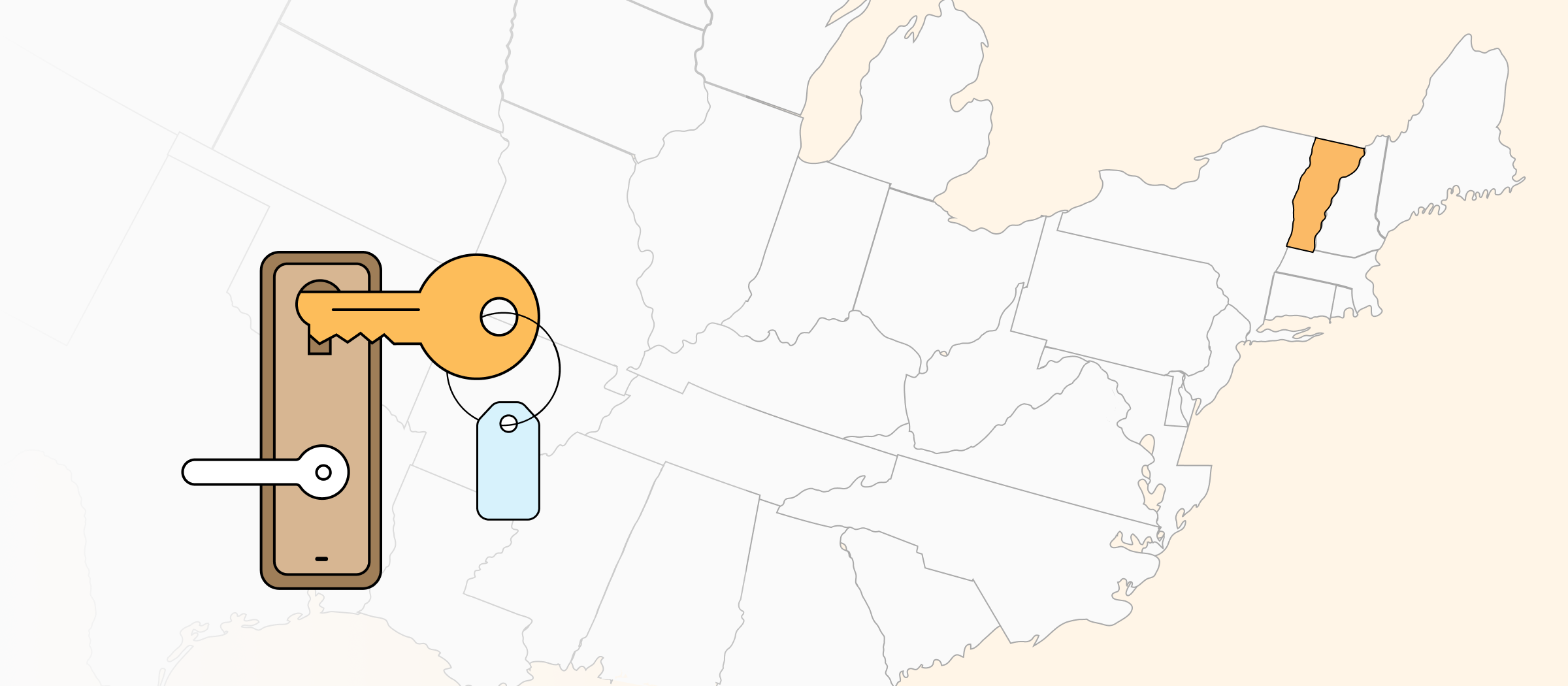| Legal Reasons for Entry |
|
| Notice Requirement |
|
| Penalties for Illegal Entry |
|
Does a Landlord Have the Right To Enter a Rental Property in Vermont?
Vermont landlords have the right to enter a rental property any time a tenant consents to the entry, and also for the following reasons:
- Inspecting the property.
- Maintenance and repairs.
- Providing agreed upon services.
- Showing the property.
- Emergencies.
Can a Landlord Enter Without Permission in Vermont?
Vermont landlords can legally enter a rental property without the tenant’s permission in emergencies. With proper notice, the landlord can also legally enter between 9:00 AM and 9:00 PM for inspections, maintenance, showings, and to provide agreed services, even when the tenant doesn’t consent.
Can a Landlord Enter Without the Tenant Present in Vermont?
Vermont landlords can legally enter rental property without the tenant present, but (unless there’s an emergency) only between 9:00 AM and 9:00 PM for inspections, maintenance, showings, and to provide agreed services, after giving proper notice.
Can a Landlord Show a House While Occupied in Vermont?
Vermont landlords can show an occupied house.
How Often Can Landlords Conduct Routine Inspections in Vermont?
Vermont landlords have no specific limit on how often they can enter for inspections. The landlord isn’t allowed to enter unreasonably often, but what’s reasonable gets decided case by case.
How Much Notice Does a Landlord Need To Provide in Vermont?
Vermont landlords have to provide at least 48 hours of advance notice before entering rental property for most legally allowed purposes outside of emergencies. However, the tenant can consent to the landlord entering on less notice.
Can a Landlord Enter Without Notice in Vermont?
Vermont landlords can’t enter without proper advance notice, except in emergencies or when the tenant explicitly consents to the entry.
How Can Landlords Notify Tenants of an Intention To Enter in Vermont?
Vermont landlords can notify tenants verbally or in writing about an intention to enter.
Can a Tenant Refuse Entry to a Landlord in Vermont?
Vermont tenants can’t usually refuse landlord entry, when the entry is between 9:00 AM-9:00 PM for a legal purpose (inspections, maintenance, showings, or providing agreed services) after the landlord has given proper notice. They are allowed reasonably to refuse other entries outside of emergency situations.
What Happens If the Tenant Illegally Refuses Entry to the Landlord in Vermont?
Vermont landlords can take any of the following actions if the tenant illegally refuses a valid entry:
- Get a court order to force access.
- Recover cost of any actual damages through a lawsuit.
- Deliver a written 30-day notice of termination for the rental agreement.
Can a Tenant Change the Locks Without Permission in Vermont?
Vermont tenants can change locks without permission if the lease doesn’t say otherwise. Note that the landlord still has a right to enter for specific reasons, so it’s reasonable for tenants to provide copies of current keys.
What Can a Tenant Do If the Landlord Enters Illegally in Vermont?
Vermont tenants can take any of the following actions if the landlord enters illegally, or demands entry repeatedly and unreasonably in a way that harasses the tenant:
- Get a court order to ban the landlord from further unreasonable or harassing entries.
- Recover cost of any actual damages through a lawsuit.
- Potentially call the police and have the landlord arrested for trespassing, if the landlord is inside the rental property without legal justification.
Sources
- 1 9 Vt. Stat. Ann. § 4460(a) (2023)
-
“A landlord may enter the dwelling unit with the tenant’s consent, which shall not be unreasonably withheld.”
Source Link - 2 9 Vt. Stat. Ann. § 4460(b) (2023)
-
“A landlord may also enter the dwelling unit for the following purposes between the hours of 9:00 A.M. and 9:00 P.M. on no less than 48 hours’ notice: (1) when necessary to inspect the premises; (2) to make necessary or agreed repairs, alterations, or improvements; (3) to supply agreed services; or (4) to exhibit the dwelling unit to prospective or actual purchasers, mortgagees, tenants, workers, or contractors.”
Source Link - 3 9 Vt. Stat. Ann. § 4460(c) (2023)
-
“A landlord may only enter the dwelling unit without consent or notice when the landlord has a reasonable belief that there is imminent danger to any person or to property.”
Source Link - 4 9 Vt. Stat Ann. § 4467(b)(1) (2023)
-
Injunctive relief and recovery of the cost of actual damages are generally available for any breach of contract, including those relating to rental property. Additionally, Vermont’s landlord-tenant law permits the landlord to terminate the rental agreement for failure to comply with its terms: “The landlord may terminate a tenancy for failure of the tenant to comply with a material term of the rental agreement or with obligations imposed under this chapter by actual notice [i.e., written notice, hand-delivered or mailed] given to the tenant at least 30 days prior to the termination date specified in the notice.”
Source Link - 5 Villeneuve v. Beane, 182 Vt. 575, 576 (Vt. 2007)
-
Injunctive relief and recovery of the cost of actual damages are generally available for any breach of contract, including those relating to rental property. Additionally, a landlord on the premises without the tenant’s permission or other explicit legal authorization may be charged with criminal trespass. See, e.g., Villeneuve v. Beane, 182 Vt. 575, 576 (Vt. 2007) (“landlord and his employees started to remove tenants’ belongings. One of the tenants returned home from work unexpectedly and discovered landlord. After a scuffle that attempted to stop landlord from continuing the removal of tenants’ belongings, the police were called and landlord was charged with trespassing and effectively removed from the premises.”)
Source Link

